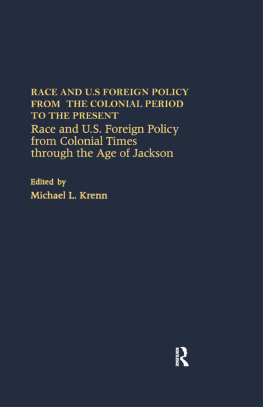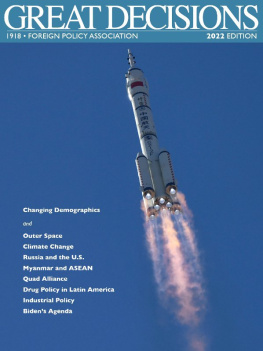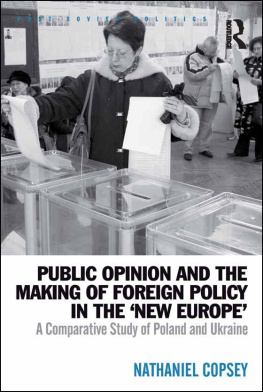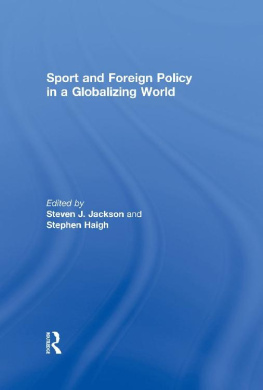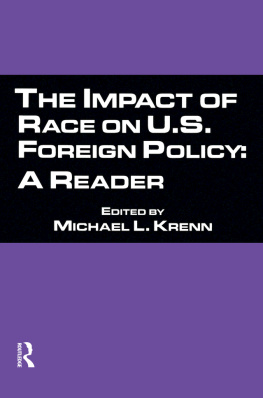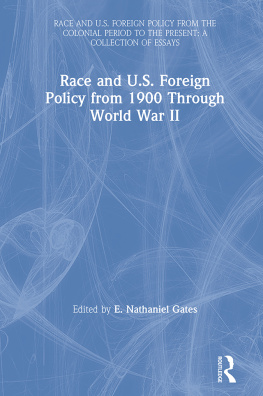Race and U.S. Foreign Policy from the Colonial Period to the Present
A Collection of Essays
Series Editor
Michael L. Krenn
University of Miami
Series Contents
1. Race and U.S. Foreign Policy from Colonial Times through the Age of Jackson
2. Race and U.S. Foreign Policy in the Ages of Territorial and Market Expansion, 1840 to 1900
3. Race and U.S. Foreign Policy from 1900 through World War II
4. Race and U.S. Foreign Policy during the Cold War
5. The African American Voice in U.S. Foreign Policy since World War II
Race and U.S. Foreign Policy from Colonial Times through the Age of Jackson
Edited with introductions by
Michael L. Krenn
University of Miami
First published 1998 by Garland Publishing, Inc.
Published 2019 by Routledge
2 Park Square, Milton Park, Abingdon, Oxon OX14 4RN
52 Vanderbilt Avenue, New York, NY 10017
Routledge is an imprint of the Taylor & Francis Group, an informa business
Introductions copyright 1998 Michael L. Krenn.
All rights reserved. No part of this book may be reprinted or reproduced or utilised in any form or by any electronic, mechanical, or other means, now known or hereafter invented, including photocopying and recording, or in any information storage or retrieval system, without permission in writing from the publishers.
Notice:
Product or corporate names may be trademarks or registered trademarks, and are used only for identification and explanation without intent to infringe.
Library of Congress Cataloging-in-Publication Data
Race and U.S. foreign policy from colonial times through the age of Jackson / edited with introductions by Michael L. Krenn.
p. cm. (Race and U.S. foreign policy from the colonial period to the present; 1)
Includes bibliographical references.
ISBN 0-8153-2955-5 (alk. paper)
1. United StatesForeign relationsTo 1865Social aspects. 2. RacismUnited StatesHistory. 3. United StatesRace relations. I. Krenn, Michael L., 1957 . II. Series.
E183.7.R24 1998
305.800973dc21 | 98-22052 CIP |
ISBN 13: 978-0-8153-2955-8 (hbk)
DOI: 10.4324/9780203822425
Contents
Paul Seabury
George W. Shepherd Jr.
Michael H. Hunt
Reginald Horsman
G.E. Thomas
Roy Harvey Pearce
Gary B. Nash
Richard Drinnon
Stuart C. Miller
Philip Borden
John J. Johnson
Thomas R. Hietala
Edward P. Crapol
The interconnections between race and U.S. foreign policy have only recently come under the close scrutiny of scholars. Perhaps this has been due to the fact that, for many students of American diplomacy, race was seen as a distinctively domestic issue, encircled by debates over civil rights, affirmative action, and discrimination. Foreign policy, at least as it was studied for generations, was viewed as being somehow disengaged or insulated from such disturbing issues as the demeaning and sometimes violent attitudes of many white Americans toward black Americans and other minority groups, and from the sufferings and protests of those same groups. After all, it was reasoned, foreign policy involves analyses of international power relations, not the sometimes tawdry conflicts between bigots and their victims; it is made and implemented not by ignorant racists but by what some have called the best and the brightest people America has to offer. Foreign policy responded to the demands of the educated and powerful elite of the nation, it was admitted, not to the racial minorities marginalized by American society.
As the selections in these five volumes indicate, however, the study of race and U.S. foreign policy has taken on a life of its own. Spurred on in large part by the powerful civil rights movement of the 1960s, historians of Americas foreign relations began to reconsider their conceptions of what the nations foreign policy was and how it was made. New questions were asked: What were the views on race of Americas diplomats, and did those views influence their words and actions? Did racism influence U.S. policies and programs directed toward peoples of color Native Americans, Latin Americans, Africans, Asians? What was racisms role in specific foreign policy actions Manifest Destiny and the war with Mexico; the Spanish-American War and the U.S. thrusts into the Pacific and the Caribbean; the Big Stick policies of one Roosevelt and the Good Neighbor policies of another; the war in the Pacific against Japan and the dropping of the atomic bombs; and Americas Cold War interventions in the Third World, particularly in Vietnam? How did the African-American population of the United States develop a foreign policy outlook, and what effect did it have on issues such as the U.S. occupation of Haiti, the Italo-Ethiopian War, the U.S. attitude toward the decolonization of Africa, and U.S. relations with South Africa?
All of these are important questions as the United States begins planning for the twenty-first century. Americas role in an increasingly shrinking world will continue to bring it face to face with different peoples and different cultures, even as the voices of the nations ever-growing minority groups grow louder and louder with each passing decade. For what all of the selected essays indicate is that (racial) power struggles at home have very distinct parallels with the assertion of American power abroad. Being one of the best and the brightest does not make one immune from feelings of bigotry and racism (indeed, as an elite group, it has often played a large role in the definition and dissemination of racial doctrines). And even minority voices, when focused and well organized, can and do have an impact on Americas foreign policy.
This present series of volumes, by bringing together the most important and informative scholarly works dealing with race and U.S. foreign policy published during the last fifty years, indicates the wide-ranging scholarly imagination and inquisitiveness of some of the disciplines leading minds. It is the editors hope that the essays comprising this series will provoke further discussion and study of this increasingly important field of American history by serving as a research aid for both students and professionals alike.
When the first English colonists clambered onto the shores of the North American continent they had already progressed rather far in defining themselves in racial terms. Ideas about the superiority of the (mythical) Anglo-Saxon race had been growing in popularity in England for years, promoted by leading philosophers, theologians, and scientists of the day. As Reginald Horsman has explained in his pathbreaking book, Race and Manifest Destiny, most Englishmen had come to accept the notion that they descended from the special and richly endowed race of Anglo-Saxons, a race particularly gifted in nation-building and the development of free and democratic institutions that served the general welfare. This race had always traveled west, perhaps starting from somewhere in central Asia, cutting a pathway of progress through eastern Europe into the dark forests of Germany, from whence its people had eventually made their way to England.


